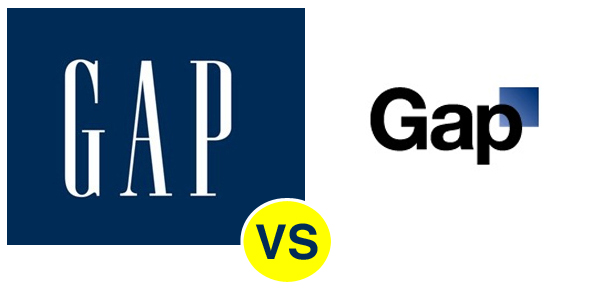
How to react to negative feedback
This article takes a look at how you can use negative feedback to your advantage and by the end of it you will hopefully have a new appreciation of the opportunities it can bring. Before that, a story…
ol.articleList li {
margin-bottom:15px;
}
In 2010 the clothing giant Gap announced unveiled their new logo design on their Facebook page. The re-branding project was rumoured to have cost $100 million and was labelled by the company as ‘a more contemporary, modern expression.’ Sadly for them, the reaction to their logo was far from what they had hoped. A backlash of criticism swept across social media and the company was faced with a very tricky situation in the face of an enormous PR disaster.
Knowing they had to react quickly and decisively, Gap made a good and very positive move. Putting focus on the fact that customers always come first, they published a message on their Facebook page:
“Ok. We’ve heard loud and clear that you don’t like the new logo. We’ve learned a lot from the feedback. We only want what’s best for the brand and our customers… we’re bringing back the Blue Box tonight.”
This is an extreme example of handling negative feedback and I’ve used it to demonstrate that how you react to negative feedback is key. As an established brand, Gap got their logo rebrand very wrong – and they’re not the first to have done this. But, by reacting to the negative feedback in the way they did, at the speed they did, they actually turned it around– giving out a strong “we listen to you” message. It is interesting to note that in the months that followed, Gap’s sales were up compared to the same period the year before.
I’ve read a lot of articles about how to give negative feedback, but very few about how to receive negative feedback. I’ve been in the situation of receiving negative feedback during my working life. In my first full-time job, I found it particularly difficult to take, in part because of the way it was relayed to me.
Although I’ve learned to handle it a lot better over the years, mostly due to adopting the mindset discussed below, there are still times where I find myself in a situation where I want to say:
‘Well I could agree with you… but then we’d both be wrong!’
I manage to stop myself 99% of the time, but sometimes I just say it anyway – just to see what happens.
So, what has changed for me? Well, over the years I’ve come to learn to be more open-minded and take emotion out of the negative message. It’s all in the mindset you adopt.
As human beings, we do take criticism very personally. As I mentioned above, I’m guilty of it too. It can become deeply personal when someone criticises something you’ve created, written or spent time on.
It’s key to remember that the person giving you the feedback often does not know you (or at least doesn’t know you as well as you do) and is not aware of everything you’ve done to get where you are. They’ve simply told you what they think, based on their own views and experiences and in their own mood at that given time. It’s just a piece of feedback – it’s up to you how you deal with it.
So, why not look at the opportunity you can get out of it? There are two major potential opportunities open to you.
Opportunity 1
When you take the emotion out of it, feedback is an incredibly useful thing. It gives you a chance to see things from another point of view. So, before you throw the feedback away or reply angrily, take some time to think about what has been said. Is there anything useful you can take from it – whether it be to adapt your functionality, explain things better or fix something and be the hero (like Gap). This represents your first opportunity.
Opportunity 2
Our second opportunity is even better. How you react to the person giving the feedback can, in the right situation, win you a lifelong customer or fan. How? Thank them for their feedback and tell them how useful it is. Say that you appreciate them taking the time to tell you and that feedback helps you develop and improve your products – whether that’s you or something you’ve made. When you personalise your reply, you will give yourself a great chance of being appreciated.
I have experienced this so many times it’s impossible to count. Even with negative feedback I’ve turned the person from someone with a negative view of my product to someone who tells me that they will not only continue to use it but will also tell all their friends and family about it. And, as any good marketer will tell you, personal recommendation is gold dust – the most valuable form of marketing. If you go above and beyond what they expect (replying quickly, thanking them for their valuable time, offering assistance) you can end up being rewarded yourself. And that’s a win-win.
It doesn’t happen all the time, of course. You’re only in control of your reaction, not theirs.
How to respond to negative feedback in person
Here’s a quick checklist for responding to negative feedback in person:
- ‘Thank you for bringing your concerns to my attention’
- ‘I always like receiving feedback as it allows me to improve and evolve my abilities and because I care about X.’
- I will take your feedback on board and will do Y and Z.
How to respond to negative correspondence
Here’s a quick checklist for responding to negative feedback in an email or correspondence:
- Thank the person for their feedback and for taking the time to write to you. You can even tell them their feedback is important to you (it is, after all). You’ll notice how many big companies adopt this approach.
- ‘I’m sorry to hear you feel this way’ (you’re acknowledging it’s how they feel about it, not that they are factually correct about what they are saying).
- Put your point across and tell them what you are prepared to do (even if it’s just keeping their feedback in mind for future updates).
Remember that you won’t win every time and you may not receive the response you want. But, much like a game of poker, you will increase your chances of winning by adopting this strategy and, importantly, you’ll find yourself released from negativity.
Good feedback is a gift – one that we love. If you change your mindset to think about negative feedback in the same way – as an opportunity – you’ll go far.
Alastair

Alastair Hazell
I am a serial entrepreneur who enjoys writing stories of inspiration. You can follow me on LinkedIn.



